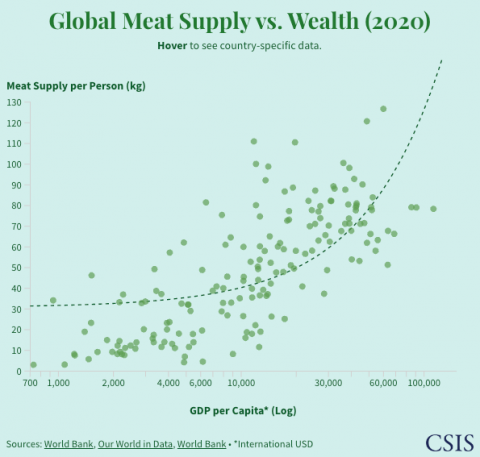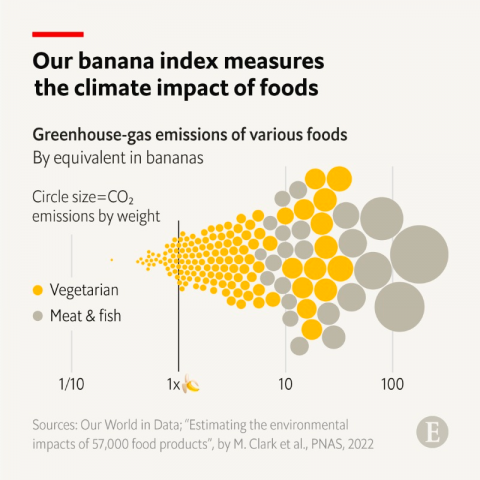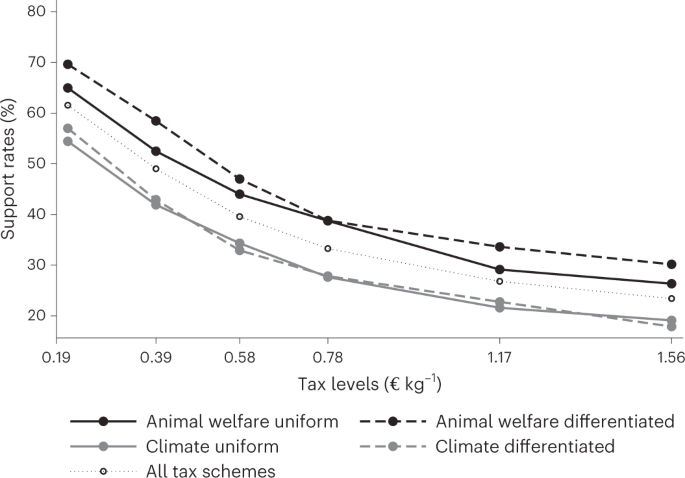Each time I talk about the need for change in the way we produce and consume foods, I am faced with surprise when I show the link between food and climate. Beyond consumers, most people in the food industry don’t yet know how much (25%) food is responsible for climate change and that animal proteins are the main part of it. Whereas a carbon tax on other goods is a common topic in many countries, talking about a potential meat tax is often seen as extremist. Let’s examine this option.
1 – Rich people eat too much meat, and that’s bad for the planet

The Economist recently published this index as a tool to measure the relative climate impact of foods compared to bananas. Without surprise, vegetarian foods are the less impactful. The index can be adjusted on their website against weight, protein and calories.

In this graph, published by the Center for strategic international studies for its report on alternative protein, we can see how national consumption of meat is against wealth. It increases exponentially as nations get richer.
There is currently a strong debate on how much meat would be healthy both for humans and the planet. The results vary between 0 (vegans) and 30kg. Using the graph above, we can see that in developed countries, consumption can be more than three times above this upper limit. As more and more people get out of poverty, how do we incentive consumers to decrease or stabilise their meat consumption? Indeed, it doesn’t seem that alternative proteins are doing such a good job at it right now.
2 – Let’s create a tax then?
In Europe, we like taxes. So, in many countries, there is a burgeoning idea of creating a “meat tax” as some countries did on sugar (“soda” taxes). On this topic, Nature, recently published a study where 2,800 German consumers were asked their reaction to a tax on animal protein products. Their reaction is summarized in the graph below. We learn two things:
- there is a majority of consumers who are quite willing to accept a reasonable tax between €0,20 and €0,40 per kg. As a German eats around 52kg of meat and 46kg of milk per year, this would represent a tax of less than 30€ per person. As a country, it would create a new revenue stream of almost €2.4B, which could then be targeted at reducing the impact of animal farming. That’s quite a lot of money compared to the €6B received by Germany through subsidies in the European agricultural policy. At a European level, such a tax would raise around €14.5B annually.This money could help livestock producers to adopt new greener practices and eventually turn farms into new productions. It could also be partially targeted to innovation. Again, to compare, less than €1B was invested into alternative protein startups in 2022 in Europe.
- Consumers are much more receptive (by more than ten percentage points) to such a tax if it’s explained as a tool to improve animal welfare than if it is explained as something targeted at climate change.

3 – Is there another solution?
There are many other solutions currently being experimented all over the world. On this topic, Europe is really a fascinating giant laboratory with many different startups creating new approaches. We can mention:
- Stores experimented with the “true” price of foods such as these in Belgium and Sweden. For their pricing, they take into account the hidden environmental and social effects of food production.
- Brands marketing on their packaging their levels of emissions to help consumers make decisions. This is notably the case of Oatly.
- Large FMCG companies partnering with lifecycle analysis startups such as CarbonCloud, CarbonMaps or PlanetFWD to measure and reduce their impact.
This is a fascinating topic. As often around sustainability, it comes down to a choice of responsibility and hence of who should pay to solve the problem. Should it be the consumers through their free will and choices? Should it be the government through a tax? Or should it be the emitters through tougher regulations?







